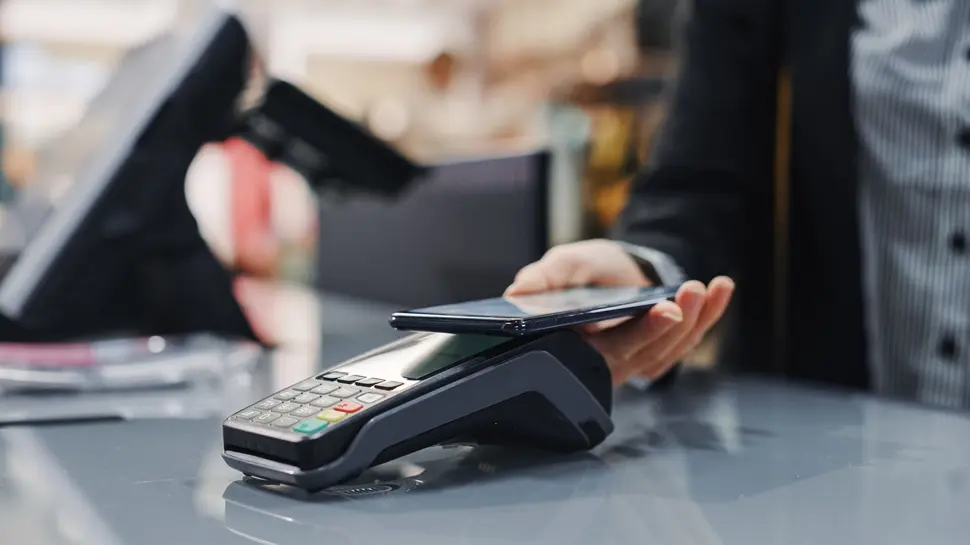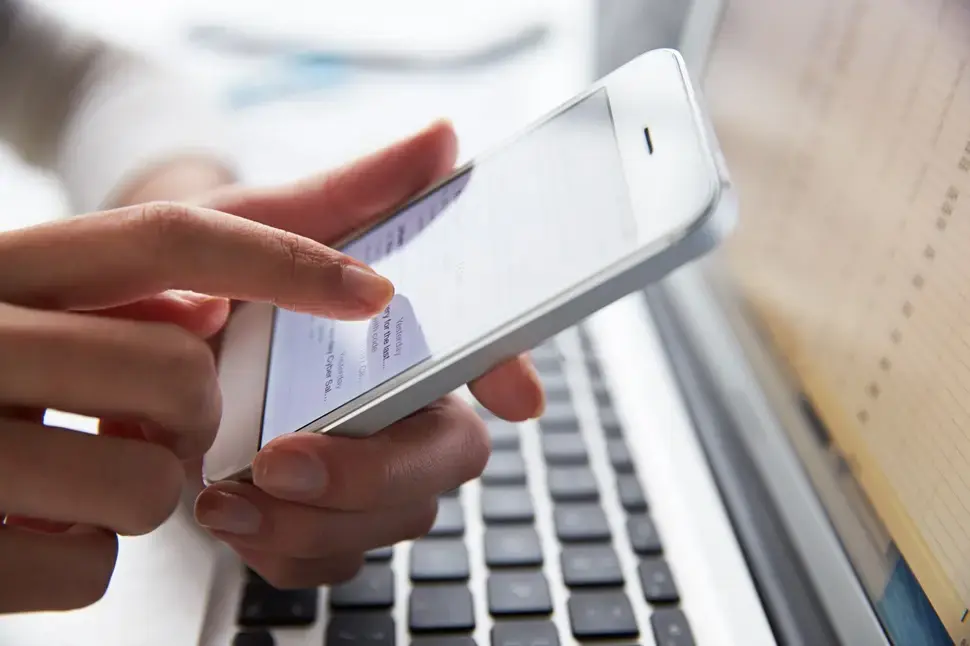Table of Contents
Updated by 02.07.2025
Mobile Payment Security Guideline
Worldwide mobile payment revenue will grow to $18.84 trillion by 2030. In other words, it’s here to stay. But, despite its convenience, it’s not immune to bad actors. Estimated mobile app finance fraud exceeded $3.2 billion between 2023 and 2024 alone.
Naturally, mobile-based phishing attacks and payment app fraud prompt business owners to ask, “Are mobile payments secure?” Luckily, there are secure Mobile Payment Solutions like E-Complish that offer robust security measures.
Additionally, if you are adopting mobile payments to future-proof your company, then adhering to the mobile payment acceptance security guidelines below will safeguard your business and customers’ cardholder data from associated security challenges.
How Mobile Payments Work

Understanding mobile payments is quite simple. Mobile users can conveniently and securely execute payments through their devices by simply bringing them close to a contactless payment terminal that establishes communication via radio frequency technology.
The encrypted data is then converted into analog signals by the payment device to complete the transaction. Some mobile payments rely on external applications like PayPal or Venmo, while others use a digital wallet stored directly on the device.
Mobile transactions use tokenization for additional security. When you set up a mobile wallet, your bank will replace your payment data with a unique set of numbers called a token. This process keeps your information encrypted and safe from fraudulent activity.
How to Make Secure Payments with Mobile Devices: Best Practices
1. Use a Trusted Payment Provider
When selecting a reliable mobile payment provider, it is essential to prioritize preventing potential fraud in contactless payments.
Your mobile payment app or platform will need strong authentication and authorization measures with regular security updates and patches to protect sensitive business and customer information.
It must also comply with the Payment Card Industry Data Security Standard (PCI DSS) – the security standard for handling credit cards from major card brands.
Failure to maintain proper security may lead to chargebacks, causing a loss of revenue and a damaged reputation.
That’s why businesses trust E-Complish – our platform’s security is impeccable. It improves fraud prevention and complies with current Data Protection Regulations.
2. Implement Biometric Verification on Your Mobile Device

In an increasingly mobile world, password-based authentication is no longer sufficient to protect sensitive card information from malicious attacks and identity theft.
Enter biometric authentication, which uses fingerprint readers and facial or voice recognition to identify the user who verifies the transaction.
75% of consumers feel biometrics are more convenient as they do not involve password memorization. And 85% of active phones in the USA already have biometric capabilities.
Replacing passwords and PINs with biometrics offers several benefits:
- Security: Biometrics are almost impossible to duplicate, share, or steal.
- Speed: Verification and authentication takes place in seconds.
- Accountability: Biometric accuracy means you can more easily trace a person during a security breach.
3. Use Secure Wi-Fi Connections
Using public WIFI networks is a no-go as they’re extremely susceptible to hacking and interception. However, some businesses, like coffee shops, offer free WIFI to attract customers.
To avoid sensitive data breaches, malware, and identity theft, you should implement the following to secure your WIFI:
- Implement WPA2 or WPA3 encryption protocols.
- Choose a strong password that’s difficult for others to guess. A combination of letters, numbers, and symbols works best.
- Disable auto-connect so other devices don’t connect to your WIFI.
- Install a firewall to block incoming unauthorized traffic.
- Use a virtual private network (VPN) to ensure a secure and private connection and encrypt sensitive data.
4. Don’t Miss Regular Software Updates on Mobile Devices

Updates often include crucial security patches that can prevent malware attacks and hacker intrusions – think of it as fixing a previously unnoticed weak spot in your operating systems.
Neglecting them leaves a door open for potential breaches. In some cases, updates may be mandatory to comply with either industry or location-specific mobile payment security standards.
Avoiding updates could also result in severe consequences for your business, including costly fines, damage to your reputation, and a breach of trust.
Don’t let the price of neglecting them – costly fines, reputation damage, a breach of trust – be a detriment to your business.
Besides, regular software updates offer users enhanced features and performance enhancements, as well as fix any known errors or glitches.
5. Monitor Transaction History
Make it a habit to review your business’ mobile banking transaction history regularly. While the frequency will vary on your transaction volume, at least once a week is recommended.
Most modern payment processing platforms automatically keep transaction records and can identify patterns of suspicious activities or anomalies that may indicate a fraudulent transaction.
This reduces the need for manual reviews and investigations. Moreover, these records can be used as evidence in case of disputes or fraud charges.
If you notice suspicious activity, you must report it to your bank immediately. Their fraud departments will investigate further and take necessary actions to prevent unauthorized activities.
6. Use Official Websites, Platforms, and Apps

Mobile wallets account for roughly 55% of global eCommerce payment transactions. As the market grows, so does the risk of cyber theft. Needless to say, you should never use unverified mobile payment applications.
Before downloading any apps, confirm the following:
- Security measures: Look for SSL (Secure Sockets Layer) encryption, PCI DSS compliance, and secure payment logos.
- Client testimonials: Do you recognize companies that claim to use their services?
- URL: The websites of reliable providers begin with “HTTPS” and usually contain the official website name of the company.
- Contact information: It’s obvious, but reputable companies will have legitimate contact information and decent customer service to answer any questions about their mobile app payment security.
7. Be Cautious with Account Selection
If any of your business bank accounts are ever blocked or frozen due to suspected fraud, compliance issues, or disputes, having a separate mobile payment account will still enable you to carry out essential business operations smoothly and without interruption and vice versa.
This includes receiving payments from clients, making payments to suppliers, paying your employees, and managing your cash flow through the alternate account. That’s why we recommend setting up a separate mobile payment checking account.
Emerging Technologies and Trends

Currently, along with the boom in AI, there are three significant developments taking place in the mobile payment industry:
- Blockchain and cryptocurrencies offer transparent transactions through decentralized networks with low fees and cross-border transfers. Significant players like PayPal have created their coin denominated in US dollars.
- Wearable devices such as smartwatches and fitness trackers can now support payments with a simple wrist tap. This convenience, currently limited to watches, is expected to expand to other wearables.
- Voice-activated payments are also gaining momentum through popular voice assistants like Siri, Google Assistant, and Alexa. This technology not only offers a hands-free experience but also enhances the accessibility of mobile applications.
Mitigating Mobile Payment Security Risks
Ensuring seamless and secure mobile payments hinges on educating users, staying vigilant, and implementing a strong mobile payment system that conforms to current security protocols.
If you’re interested in mobile payment solutions, then E-Complish can help. Our mobile payment system offers advanced tools to streamline payment processing with appropriate security measures for small- to large-enterprise businesses.
Contact us today to bring greater convenience to your business and customers.
Table of Contents

